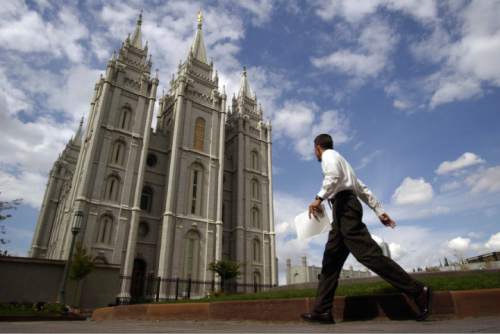This is an archived article that was published on sltrib.com in 2015, and information in the article may be outdated. It is provided only for personal research purposes and may not be reprinted.
Faithful Mormons who support gay marriage have been assured repeatedly by top leaders that they aren't in danger of losing their temple privileges — even though the LDS Church takes the opposite view on such unions.
Now these card-carrying members are worried, given that the Utah-based faith recently classified Mormons in same-sex marriages as "apostates."
That policy pronouncement may make it difficult for those who back same-sex marriage to answer one of the "recommend" questions asked of Latter-day Saints seeking entrance to Mormon temples.
Such candidates must assert that they do not "support, affiliate with, or agree with any group or individual whose teachings or practices are contrary to or oppose those accepted by The Church of Jesus Christ of Latter-day Saints."
Further, "Handbook 1," which details church policies for lay leaders, declares: "Bishops and their counselors must take exceptional care when issuing recommends to members whose parents or other close relatives belong to or sympathize with apostate groups. Such members must demonstrate clearly that they repudiate these apostate religious teachings before they may be issued a recommend."
When asked if the new designation of same-sex couples as "apostates" would have consequences for gay-marriage supporters, LDS Church spokesman Dale Jones declined to answer the question directly.
Jones instead pointed to the latest policy's "clarification," issued Nov. 13 by the faith's governing First Presidency, which the spokesman said directed local LDS leaders "who need further direction to counsel together, seek the guidance of the Spirit and work with those in their priesthood lines."
Jones added that "newspaper articles are not the best place to respond to particular questions that will be handled sensitively according to circumstances."
Those comments may not provide much comfort to the many Mormons — gays and their allies — traumatized by the new policy, which generally bars children of same-sex couples from having a "naming blessing" or being baptized into the faith until they are age 18 and are willing to disavow "the practice of same-gender cohabitation and marriage."
Latter-day Saints wonder how many temple-going members in the 15 million-member faith will be affected, especially after hearing of instances in which some members already have been denied recommends.
—
Belief and loyalty test • A temple recommend is a card given to devout Mormons attesting to their "worthiness" to participate in the faith's highest rituals, including "sealings" in which couples are married for eternity.
During recommend interviews, local lay leaders ask Latter-day Saints, for instance, if they believe in God and Jesus Christ and the LDS Church as the restoration of pure Christianity.
They ask whether members live Mormon principles such as paying tithing and abstaining from alcohol, tobacco, tea and coffee.
Final decisions are left up to local officials, who have been given authority over those in their flocks.
That's what troubles Mormon author and blogger Jana Riess, who is watching how this new policy will be implemented by the church's diverse lay leaders.
"I am concerned that the ambiguity of this new policy of calling same-sex married couples apostate will affect the way that temple recommends are issued and renewed," says Riess, who lives in Cincinnati. "One bishop or stake president [regional leader] may consider it no problem at all for a temple recommend-holding member to support same-sax marriage, while another will consider it serious enough to warrant denying a recommend."
Riess hopes that the church's previous assurances will hold and that LDS officials will make that clear.
In February 2008, LDS Church President Thomas S. Monson, then newly installed as the faith's leader, said there was room for opinions both sides of the issue.
Mormon apostle D. Todd Christofferson echoed this sentiment in interviews earlier this year with The Salt Lake Tribune.
"There hasn't been any litmus test or standard imposed that you couldn't support that if you want to support it, if that's your belief and you think it's right," Christofferson said in January.
Problems arise only when a member makes "a public, sustained opposition to the church itself or the church leaders and tries to draw others after them," he said, and that support swells into "advocacy."
Those remarks were before this recent policy shift, though.
—
Some distinctions • Spencer W. Clark, executive director of Mormons for Marriage Equality, has faced no church censure for his public support of gay marriage.
Clark, an expert with the U.S. Environmental Protection Agency, is married to a woman, has three children, is active in a French-speaking LDS congregation in Maryland, and is an ordinance worker in his faith's Washington, D.C., temple.
He hasn't been challenged about his stance on marriage equality, Clark says, because he has a close relationship with his ecclesiastical leaders — and because there are clear distinctions between individual "apostates" and "apostate groups."
"Handbook 1" references "apostate religious teachings," he says, "something integral to Mormon fundamentalist groups, which continue to practice polygamy [that the LDS Church abandoned more than a century ago] but which isn't applicable to LGBT groups. These preach legal equality or social acceptance, not competing religious philosophies."
It should be possible, he says, to support "both civil marriage equality generally, as well as gay couples they know individually, because the commitments and protections of marriage are better for these families and society as a whole."
That, he says, "shouldn't threaten [the supporters'] standing in the LDS Church."
Though Clark does not fear church sanction for himself, he does worry about "many Latter-day Saints elsewhere whose leaders will feel emboldened by the policy to take action against LGBT sympathizers."
Twitter: @religiongal



